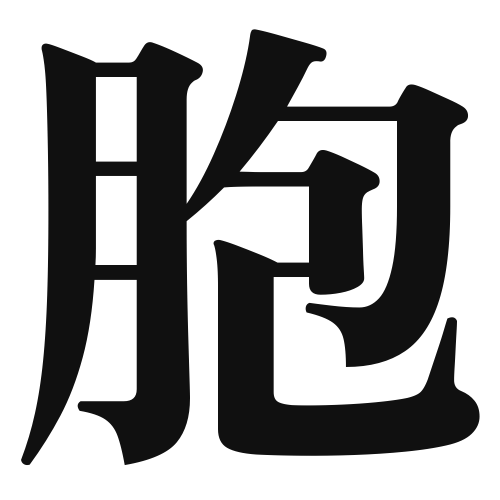1. Overview of Meaning
The kanji “胞” (hō) generally means “membrane” or “sac.” It is often used in biological contexts to refer to structures that enclose or protect something, such as cells or organs.
2. Formation and Radical
Formation of the Kanji: The kanji “胞” is a phonetic-ideographic character (形声文字). It combines the radical for “skin” or “enclosure” (月) with a phonetic component that suggests its pronunciation.
Radical: The radical of “胞” is 月, which is often associated with body parts or flesh, indicating its connection to biological structures.
3. Examples of Usage
Common Words and Phrases: Some frequently used words that include “胞” are:
- 細胞 (さいぼう, saibō) – “cell”
- 胞衣 (えな, ena) – “afterbirth”
Example Sentences in Daily Conversation:
- 「私たちの体は多くの細胞でできています。」(Watashitachi no karada wa ōku no saibō de dekiteimasu.) – “Our body is made up of many cells.”
- 「この植物の胞はとても重要です。」(Kono shokubutsu no hō wa totemo jūyō desu.) – “The membrane of this plant is very important.”
4. Synonyms and Antonyms
Similar Kanji: A similar kanji is “膜” (まく, maku), which also means “membrane” but is often used in a more general sense, such as in “膜を張る” (maku o haru) meaning “to cover with a membrane.”
Antonyms: An antonym could be “開く” (ひらく, hiraku), meaning “to open,” as it suggests the opposite action of enclosing or protecting.
5. Cultural and Historical Background
Relation to Japanese Culture: The concept of “胞” is significant in various aspects of Japanese culture, particularly in traditional medicine and biology, where understanding the structure of living organisms is essential.
Proverbs and Idioms: While there may not be specific proverbs that directly reference “胞,” the understanding of cells and membranes is crucial in discussions about health and life, reflecting the importance of biological knowledge in Japanese society.
